The Ultimate Round-Up of Content Marketing Tips from 2023

In 2023, content marketing transformed remarkably. It’s no longer just about churning out content. Now, it’s about creating value that resonates with your audience. Staying ahead with the latest trends isn’t just beneficial; it’s essential.
Top marketers agree. As Michael Brenner (the CEO of Marketing Insider Group) puts it, “Content marketing is more than a buzzword. It is the hottest trend in marketing because it is the biggest gap between what buyers want and what brands produce.”
This insight underscores the evolving landscape. Whether it’s fresh content marketing ideas or strategies, understanding these changes is key to your success.
Embrace Diverse Content Types: Beyond Texts and Images
A. The Rise of Different Content Formats
The impact of diverse content formats on search engine rankings and social media presence is undeniable. A staggering 90% of consumers say videos sway their purchasing decisions. This trend highlights video content’s immense popularity and effectiveness. Social media platforms often showcase this shift, where innovative video content often outperforms traditional posts.
Podcasting is another frontier witnessing a surge, especially among younger audiences. In October 2022, 63% of Gen Z consumers engaged with podcasts. This shift towards varied content consumption underlines the need for marketers to adapt and diversify.
Remember, it’s about speaking your audience’s language. As one marketing sage advises, “Actually talk to your customers. Use the language that they use. Talk about the things they talk about. Never feed salad to a lion.” This analogy by Jay Acunzo (a storyteller and author) aptly captures the essence of tailoring content formats to audience preferences.
B. Special Focus: Short-Form Video Content
Short-form videos have emerged as a potent tool in content marketing, offering impressive returns on investment. These bite-sized videos, often showcased on platforms like Instagram, pack a punch in storytelling and brand messaging.
A prime example is Colgate’s #MakeMomSmile challenge for Mother’s Day. By encouraging users to share videos doing something special for their moms, Colgate tapped into the power of short-form videos to create a global, heartwarming campaign. This case highlights how short videos can significantly impact brand engagement and audience connection.
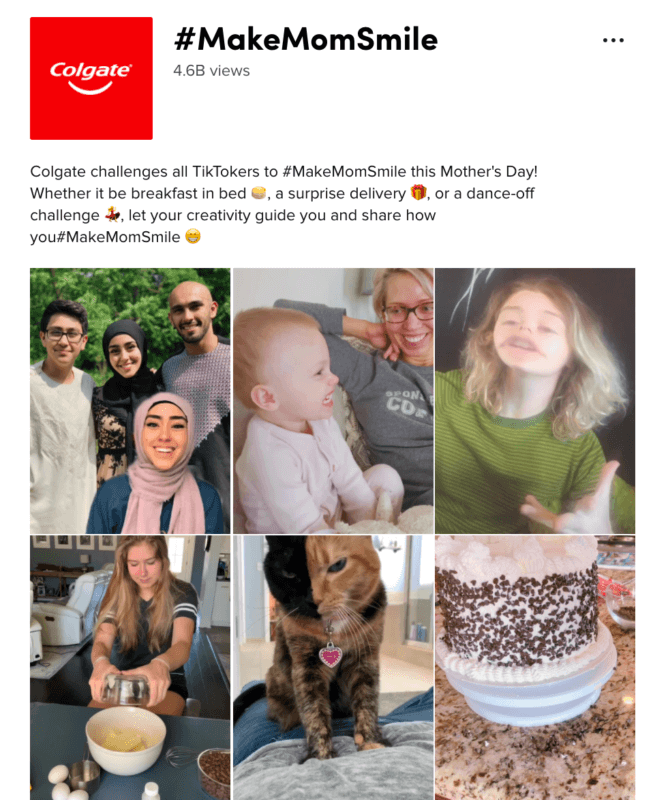
Overall, the shift towards diverse content types is reshaping content marketing. It’s a vivid reminder that to truly connect with today’s audience, marketers must evolve beyond traditional texts and images.
Also Read: All You Need to Know About Youtube Shorts
Aligning Values and Marketing Content
Reflecting brand values in content is crucial for building trust and connecting with customers. Rachelle Kuramoto, VP of Content for BIP Ventures, emphasizes this:

This insight underscores the importance of content that genuinely represents a brand’s ethos. Brands prioritizing values, especially sustainability, resonate more deeply with their audience. In fact, 64% of customers feel they can more easily trust a brand that shares their values.
This statistic isn’t just a number; it’s a testament to the growing demand for value-aligned content. By reflecting genuine values, brands don’t just market; they connect, build trust, and foster lasting relationships with their audience.
Also Read: Building Trust and Loyalty Through Brand Authenticity in Content Marketing
Influencer Marketing: The Human Touch in Digital Reach
92% of marketers believe that influencer marketing is a powerful tool in today’s time. And it’s true. Influencer marketing plays a vital role in humanizing brands and forging deeper connections with consumers. It’s about authenticity and relatability.
Annabelle Nyst, a digital marketing expert, sums it up: “Influencer marketing doesn’t just get you in front of the audience you’re trying to reach—it gets you there in a way that feels authentic and human.” This human touch transforms brand perception, building trust and loyalty.
Here are four strategies focused on humanizing brands and strengthening consumer connections:
- Genuine storytelling: Choose influencers who share real, relatable stories that align with your brand, making the connection feel more personal.
- Interactive campaigns: Engage influencers in campaigns that encourage audience participation, fostering a sense of community.
- Behind-the-scenes content: Showcase the human side of your brand through influencer-led, behind-the-scenes glimpses.
- Responsive engagement: Encourage influencers to actively engage with their audience, responding to comments and feedback, to build a two-way relationship.
By employing these strategies, brands can leverage influencer marketing not just to reach audiences, but to resonate with them on a human level. This approach is key to creating lasting, meaningful connections in the digital landscape.
Also Read: Top 5 Influencer Marketing Strategies
Incorporating AI and Emerging Technologies
AI tools like ChatGPT are revolutionizing content creation, offering new possibilities for efficiency and innovation. Anne McSilver, a Senior Content Marketing Manager and Editor at LinkedIn emphasizes the burgeoning role of AI tools:

This sentiment reflects the industry’s drive to harness AI while maintaining ethical and quality standards. Industry experts predict AI will increasingly shape content strategies, enhancing personalization and data analysis. With the market for AI in marketing projected to surge to $107.5 billion by 2028 from $15.84 billion in 2021, its influence is undeniable.
Here’s how industry mavens view AI’s future role:
- Personalization at scale: AI will tailor content to individual preferences, making experiences more relevant.
- Enhanced creativity: AI will assist in generating ideas and content, providing a creative partner for marketers.
- Efficient workflow: Automating mundane tasks will free up time for strategic and creative thinking.
- Data-driven insights: AI’s ability to analyze vast data will lead to more informed decisions.
- Ethical considerations: As AI becomes ubiquitous, ensuring its responsible use will be paramount.
As AI continues to evolve, its role in content marketing will undoubtedly expand, offering exciting opportunities for innovation while also presenting new challenges to navigate.
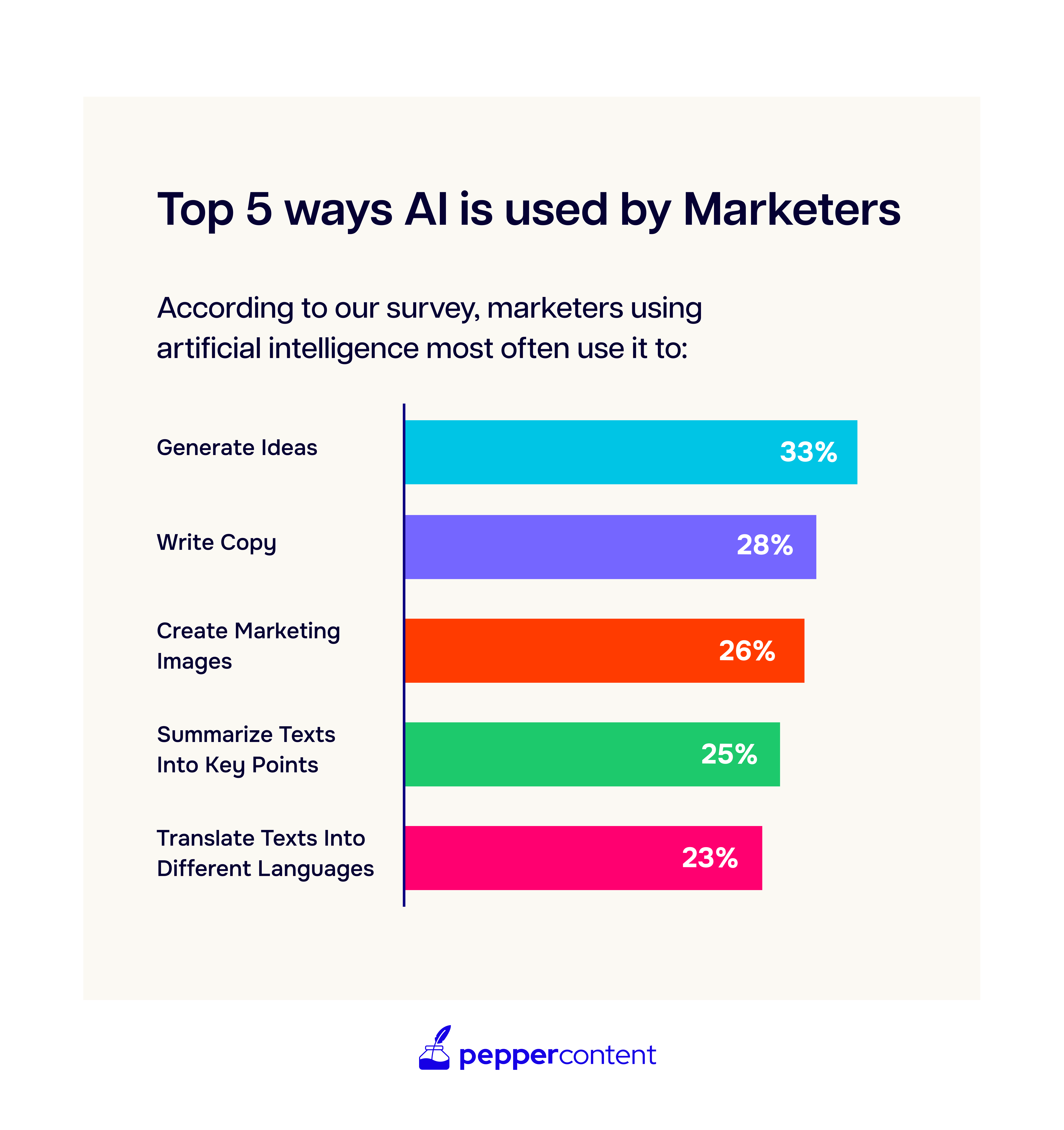
Also Read: AI Content Generation: A Beginner’s Guide
The Depth of Content: Long-Form and Live Videos
In today’s fast-paced digital world, depth matters. Brands are discovering the power of long-form content and live videos to captivate audiences and boost SEO.
Long-form content stands out for its detailed exploration of topics. Backlinko’s findings are compelling: pages with longer content often rank higher, with the average word count of a Google first-page result being around 1,890 words. This length allows for a thorough discussion, positioning your brand as an authority and keeping readers engaged.
Talking about the auditory world, podcasts are reshaping how we consume content. The number of podcast listeners jumped from 383.7 million in 2021 to an estimated 504.9 million by 2024.
Julia McCoy, a leading content strategist, sees podcasts as a vital part of a “beautiful lead generation ecosystem.” She says that when integrated with other content forms, podcasts can significantly boost your business’s long-term growth.
Similarly, live videos are carving their niche. With the global live-streaming market expected to hit $223.98 billion by 2028, this format’s immediacy and authenticity are unparalleled. Live streaming invites audiences into a real-time conversation, building a unique, personal connection.
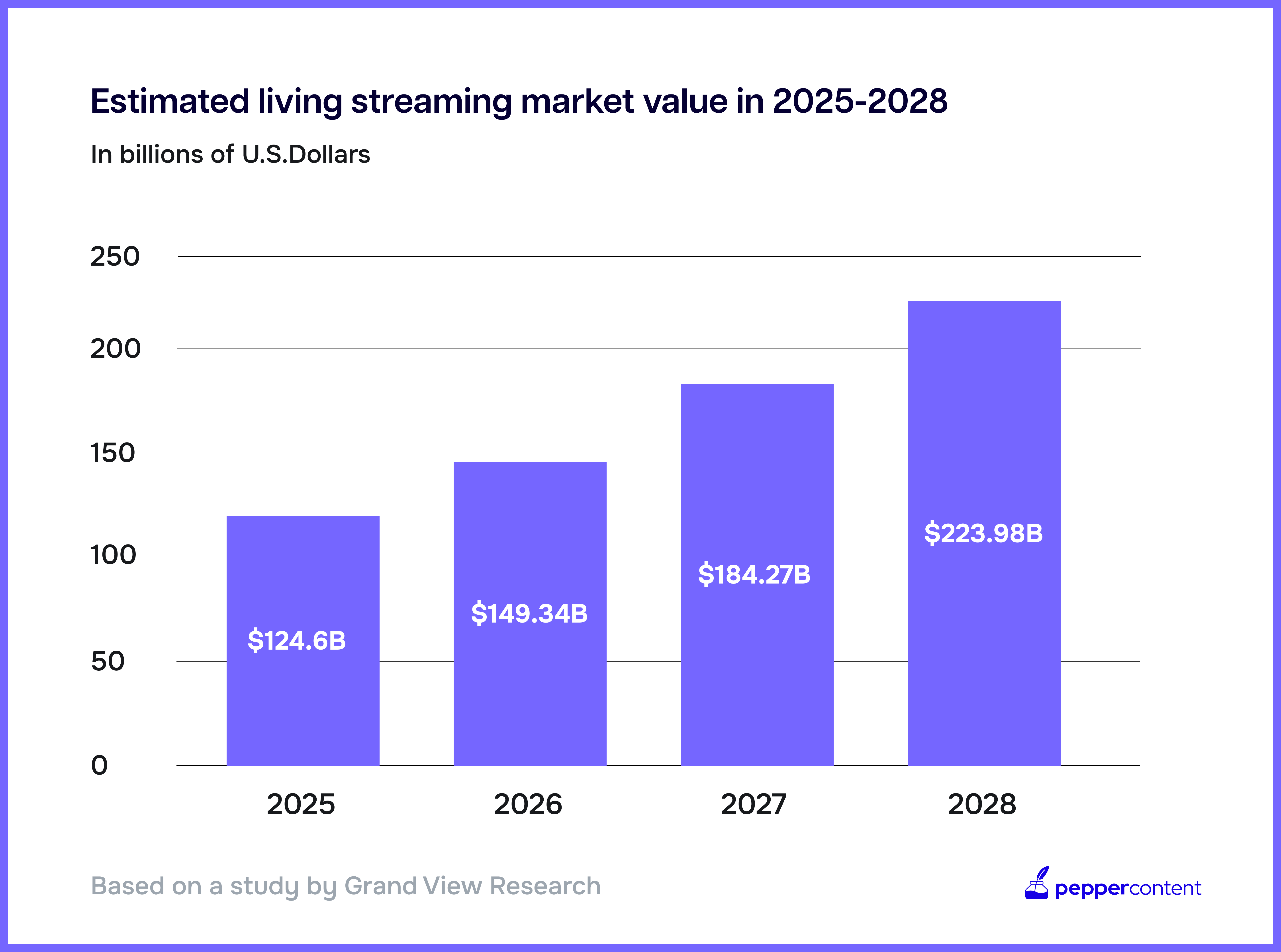
The trend is clear: long-form content, podcasts, and live videos are not just passing fads. They represent a strategic shift towards more engaging, in-depth content that resonates with today’s audience, driving both SEO and deeper customer relationships.
Also Read: Long-Form Writing: 7 Easy Tips to Follow
Authentic Voices: The Power of User-Generated Content (UGC)
UGC harnesses the voices of customers to build trust and boost engagement. With 84% of consumers placing higher trust in peer recommendations over other advertising forms, the power of UGC is undeniable.
Take Coca-Cola’s “Share a Coke” campaign as a prime example. By replacing its iconic branding with popular names, Coca-Cola struck a personal chord with young adults worldwide. This initiative, which began in Australia in 2011 and then expanded globally, wasn’t just about personalization; it was about creating shared moments of happiness.

Key strategies of the “Share a Coke” campaign included:
- Personalization: Featuring popular names on bottles and cans, Coca-Cola made each drink feel like a personal message to or from someone special.
- Emotional connection: The campaign encouraged people to share a Coke with loved ones, turning a simple act of drinking soda into a gesture of care and connection.
- Social media integration: By urging customers to share their experiences online, Coca-Cola amplified the campaign’s reach and engagement, making it a viral sensation.
- Multichannel marketing: The campaign’s presence across retail, TV, and social media ensured a broad and impactful reach.
- Strong call-to-action: The word “Share” didn’t just describe the action; it embodied the spirit of community and connection, prompting people to engage with the brand and each other.
From Coca-Cola’s success, it’s clear that businesses can significantly benefit from embracing UGC. By personalizing content, forging emotional connections, leveraging social media, utilizing multiple channels, and having a clear call-to-action, brands can create authentic and engaging experiences that resonate with consumers.
Also Read: 15 Stats About User-Generated Content that You Can’t Ignore
SEO and Content: Crafting for Impact and Visibility
In the digital age, SEO and content are intertwined, each playing a pivotal role in ensuring your message reaches the right audience and resonates with them. Effective keyword research and adaptable content models are the bedrock of this strategy, guiding you to create content that’s not just seen but also impactful.
Monika Rai, Head of SEO at Splash Learn, captures the essence of a robust SEO strategy:

This advice goes beyond basic keyword insertion, urging creators to dive deep into the audience’s needs and search behaviors. To craft content for various search engine result types, tick off these tips suggested by SEO experts:
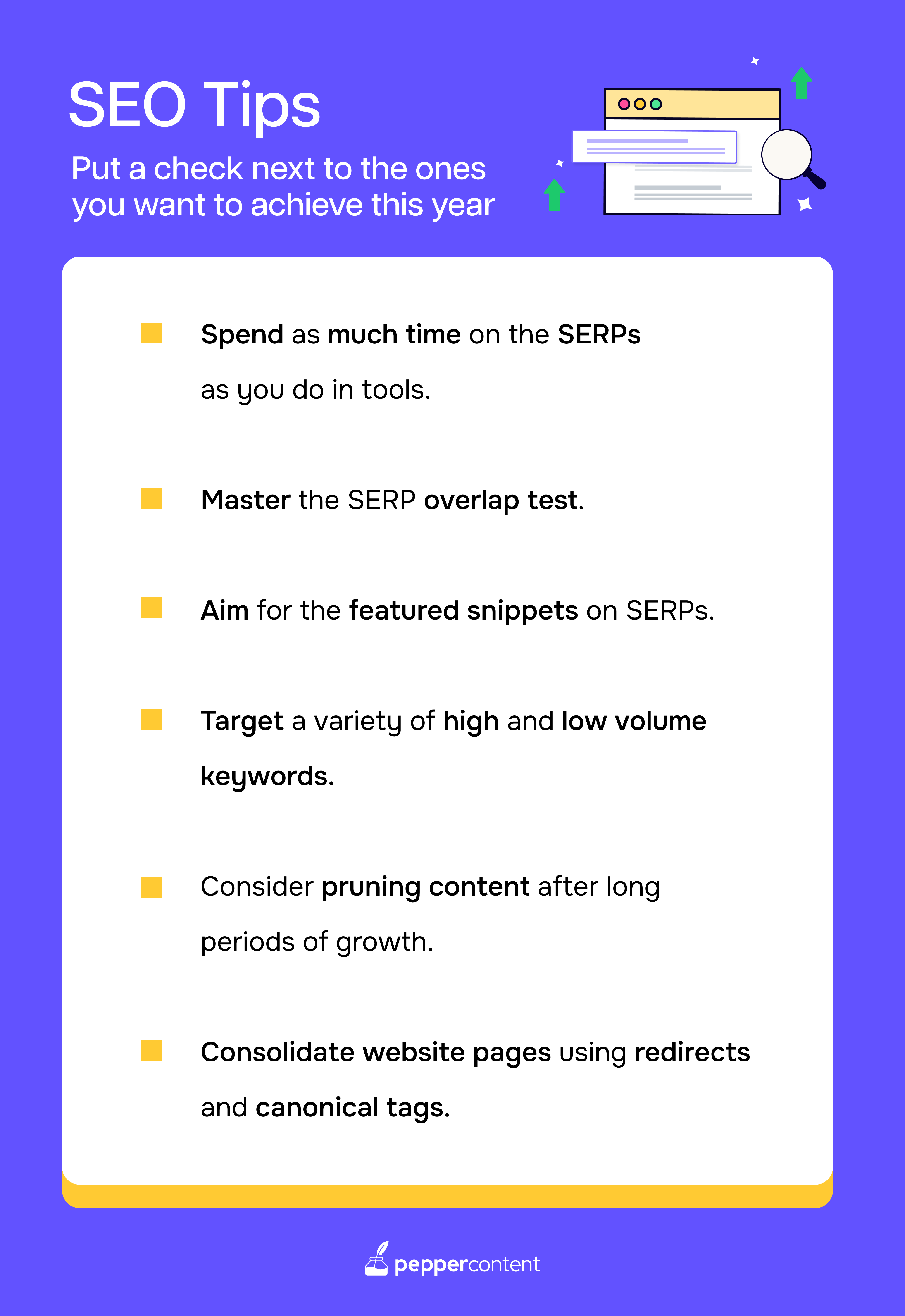
By integrating these strategies, you’re not just chasing the latest SEO trends but building a foundation for long-term visibility and impact. It’s about understanding and adapting to how your audience searches and engages with content online.
Also Read: How To Find a Balance Between SEO and Content Marketing
ROI in Focus: Measuring Content’s True Value
Measuring the ROI in content marketing presents significant challenges, with 33% of content marketers acknowledging the difficulty of this task. Despite these hurdles, understanding content’s true value is crucial for refining strategies and demonstrating impact.
Seth Godin, a prominent author and business thinker, succinctly states:

This highlights the fundamental role of content in today’s marketing landscape and underscores why measuring its ROI is more critical than ever. Without clear insights into what’s working, you can’t steer your strategy effectively.
To tackle ROI measurement challenges, consider these strategies from successful tracking initiatives:
- Set clear goals: Define what success looks like for each piece of content, whether it’s lead generation, sales, or engagement.
- Use the right tools: Employ analytics tools to track user behavior, conversions, and engagement.
- Monitor the entire funnel: Understand how content influences the customer journey at every stage.
By approaching ROI with a strategic, goal-oriented mindset and utilizing the right tools and insights, you can overcome measurement challenges and reveal the true value of your content marketing efforts.
Also Read: 7 Steps to Generate ROI with B2B Content
Human Content vs. AI-Generated Content
The debate between AI-assisted vs. human content is pivotal in today’s content landscape. Here’s a tabular comparison, including case studies and expert opinions: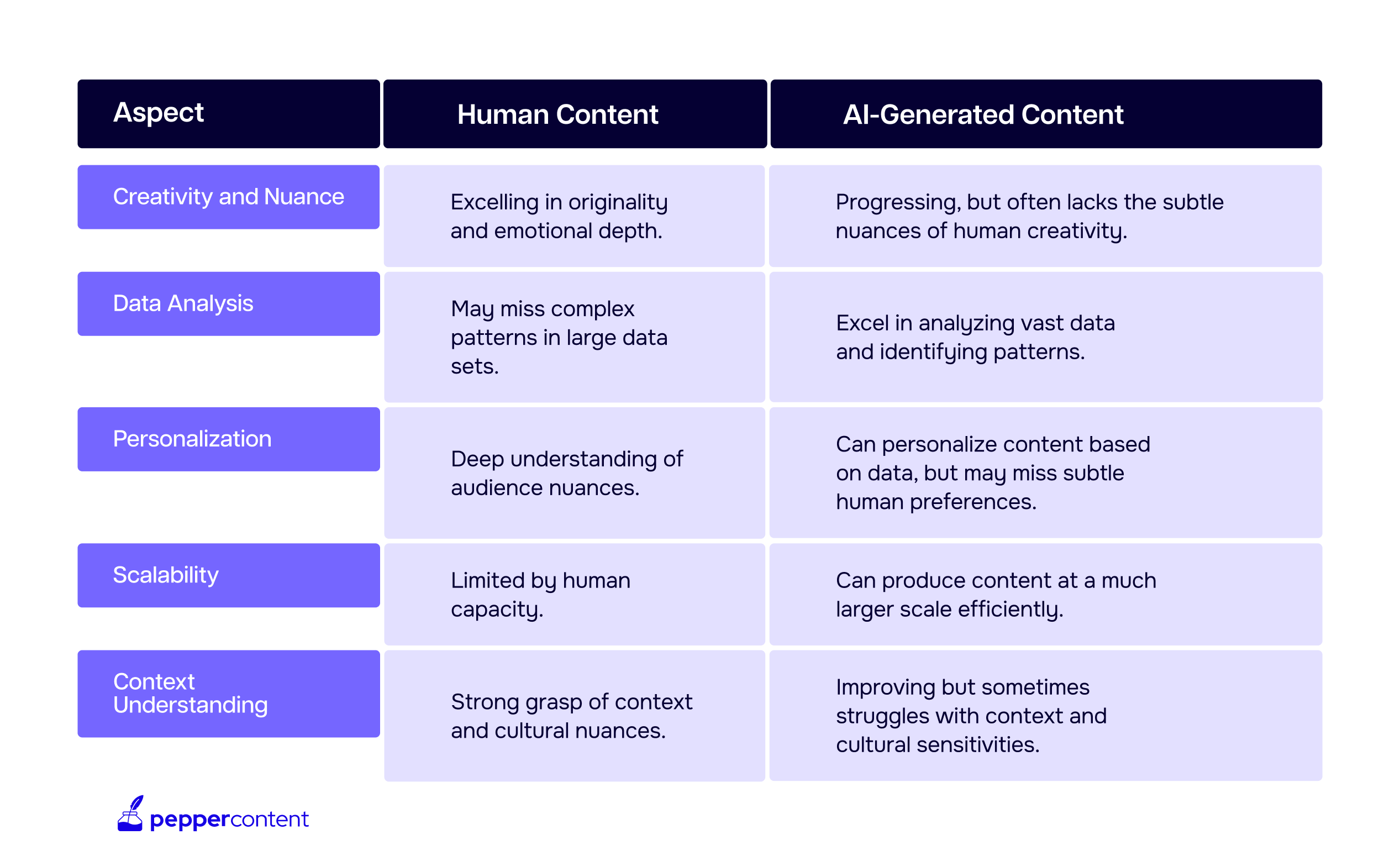
Harshna Pasari, Head of Marketing at BlueStone, highlights AI’s role:

This underscores AI’s analytical strength and the need for human oversight. Spotify exemplifies the synergy of AI and human content. Their AI algorithms analyze listening patterns for personalized playlist suggestions, while human curators craft playlists and spot trends.
This blend has established Spotify as a leader in music streaming, offering a personalized experience that’s both data-driven and human-curated. This case study demonstrates the effectiveness of combining AI efficiency with human insight, keeping users engaged and continuously exploring new music.
Embracing Tomorrow: Key Takeaways for Future Success
As 2023 reshapes content marketing, key trends include embracing diverse formats like long-form and live videos, leveraging user-generated content, and balancing human creativity with AI’s analytical power. Prioritizing SEO and measuring ROI remain crucial while understanding and adapting to these evolving dynamics is essential for future success.
By staying agile, embracing innovative strategies, and maintaining a focus on authenticity and audience engagement, marketers can position themselves at the forefront of tomorrow’s content landscape. Adapt today, and you’ll navigate the future of content with confidence and creativity.
Looking for high-quality and well-optimized content? Don’t forget to check out Pepper Content’s expert-led writing services.to supercharge your content marketing strategy.
Latest Blogs
Learn how to rank on AI search engines like ChatGPT, Perplexity, and Gemini by optimizing your content for authority, structure, and relevance. Stay ahead in AI-driven search with this strategic guide.
Explore the best healthcare SEO services for your medical practice. Improve online visibility and effectively reach more patients in need of your services.
Discover top social media agencies specializing in banking solutions, enhancing financial services and driving engagement.
Get your hands on the latest news!
Similar Posts

Content Marketing
4 mins read
11 Best B2B Content Marketing Agencies for B2B Companies in 2024

Content Marketing
5 mins read
Top ecommerce Marketing Agencies with Proven Strategies for 2024

Content Marketing
5 mins read